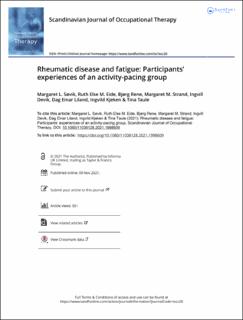Rheumatic disease and fatigue: Participants’ experiences of an activity-pacing group
Søvik, Margaret Ljosnes; Eide, Ruth Else Meh; Rene, Bjørg; Strand, Margaret M.; Devik, Ingvill; Liland, Dag Einar; Kjeken, Ingvild; Taule, Tina
Peer reviewed, Journal article
Published version
Permanent lenke
https://hdl.handle.net/11250/2883379Utgivelsesdato
2021Metadata
Vis full innførselSamlinger
- Import fra CRIStin [3604]
- Institutt for helse og funksjon [584]
Originalversjon
Søvik, M. L., Eide, R. E. M., Rene, B., Strand, M. M., Devik, I., Liland, D. E., . . . Taule, T. (2021). Rheumatic disease and fatigue: Participants’ experiences of an activity-pacing group. Scandinavian Journal of Occupational Therapy. 10.1080/11038128.2021.1998609Sammendrag
Background
Fatigue is a common symptom of inflammatory rheumatic disease and has a great impact on everyday life. Activity-pacing is proposed as an intervention to increase participation in meaningful activities.
Aims
To explore participants’ experiences with an activity-pacing group, how participants perceived self-managing everyday life after group attendance, and their reflections on unmet needs that could enhance self-management of everyday life with fatigue.
Materials and methods
Semi-structured interviews were conducted with 10 participants who had attended an activity-pacing group. Thematic analyses were conducted.
Findings
Prior to group attendance, the participants expressed an awareness of their lack of knowledge of fatigue. Through group attendance, they increased their understanding of fatigue and their ability to apply strategies to better manage everyday life. Participants found it difficult to balance their energy use and realised that implementing activity-pacing strategies takes time. Therefore, they requested follow-up sessions with the activity-pacing group. They also desire that rheumatologists pay more attention to and acknowledge fatigue.
Conclusions and significance
Enhancing the understanding of fatigue and how to manage everyday life with fatigue, appears to be important. Group interventions led by occupational therapists and with a focus on activity-pacing may be a suitable approach. Follow-up sessions are recommended.

